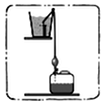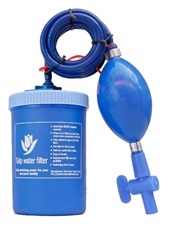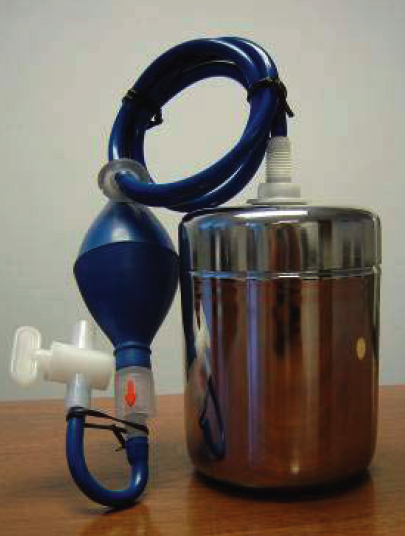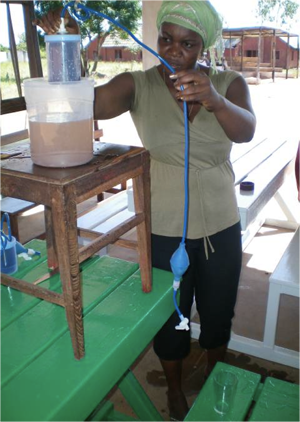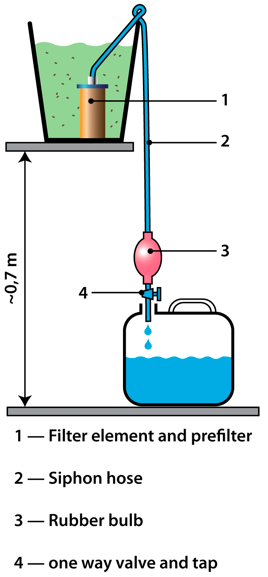Difference between revisions of "Talk:虹吸过滤器"
TranStation (talk | contribs) |
TranStation (talk | contribs) |
||
| Line 69: | Line 69: | ||
}} | }} | ||
| − | + | 每年都需要假设过滤器的替换数据,而假设塑料部件的替换数据需要5年以上。 | |
| − | === | + | ===实地经验=== |
| − | + | 目前在多个地区发布,包括埃塞俄比亚、马拉维、印度、印度尼西亚、坦桑尼亚、莫桑比克、马达加斯加、肯尼亚、厄瓜多尔、秘鲁、危地马拉、加纳、孟加拉国等。 | |
| − | === | + | |
| − | * [[Solution_of_the_week_6| | + | ===指南、视频和链接=== |
| + | * [[Solution_of_the_week_6|第六周过滤水的解决方法]] | ||
* [http://www.basicwaterneeds.com/wp-content/uploads/2013/11/User-manual-Siphon-water-filter.pdf Tulip Siphon Water Filter Instruction manual] | * [http://www.basicwaterneeds.com/wp-content/uploads/2013/11/User-manual-Siphon-water-filter.pdf Tulip Siphon Water Filter Instruction manual] | ||
Revision as of 00:50, 19 September 2017
虹吸过滤器是一种烛形滤水器,它利用吸引压力迫使水通过高质量陶瓷过滤元件。这种创新的利用吸虹的方法可以达到每小时4到6公升的高速流量。吸虹滤水器十分简洁,只有一个过滤元件、一个塑料孔,和一个必备的阀门,同时也可以利用现有的储藏容器。在水进入陶瓷元件之前,一块可洗的布被用作预滤器。这样的话,在用浑水的话,它可以防止陶瓷元件过早堵塞。滤水器被设计用作家庭日用使用点。过滤元件是用银浸渍的,以此来提高过滤的效率。
Contents
适用条件
| 优点 | 缺点 |
|---|---|
| -使用简单:在15到20公升之后,上面的容器需要被再次填满 - 胶态银为7.000公升创造了一些剩余效应 |
- 如果水中含有细粉砂,滤水器会堵塞 - 当有泄露时,滤水器没有指示/提醒系统 |
|
|
Construction, operations and maintenance
Operation
The filter element is placed in a container with contaminated water, situated about 70 cm above the clean water container. The siphon action is started by squeezing the rubber bulb. The siphon pressure forces the water through the filter element, ensuring a high flow of water.
Manufacturing
The Siphon filter was developed and is now produced by Basic Water Needs India, a company based in the Netherlands, with a factory in Pondicherry, India. The ceramic filter is quite fragile, the plastic is robust. Before 2011, leakage problems were solved by gluing the candle caps under strict quality control, however newer models do not have this leakage problem. Plastic bulbs are made in one piece from EVA (material used in hospitals for plastic hoses).
It is not possible to produce the filter locally due to a lack of quality control and unavailability of raw materials or sometimes only the initial investments needed for this. It is possible however, to import the filter elements and assemble these into local plastic parts. This is always done in cooperation with and under the quality control of Basic Water Needs. Local production will be applicable if there’s existing industrial infrastructure. Other products made with the ceramic filter element is the Tulip Table Top water filter and Tulip Group filter.
Treatment Efficiency
The Siphon filter has been tested using a certified method by “Waterlaboratorium Noord”, an independent laboratory based in the Netherlands. It was found that even after passing 7000 liters of heavily contaminated water, the filter still removed E. Coli by more than 99.99%. The E. Coli test is used as an indicator for the removal of pathogenic bacteria in water. Water-borne bacteria are responsible for the large majority of diseases caused by contaminated water.
Maintenance
After some time, the flow rate may reduce because of clogging of the filter element. In this case, the filter can be cleaned by backwashing. This is done by closing the valve and squeezing the rubber bulb, which forces the water back through the filter element, pushing dirt particles out and unclogging the filter. This backwash option increases the lifetime of the filter element.
Estimated Lifespan
The filter element could produce up to 7,000 litres (enough for a large family for 1 year) of water before replacement. The plastic parts last up to 5 years.
成本
| Capital cost | Operating cost | Replacement cost | Estimated 5 year cost | Cost / metre cubed treated |
|---|---|---|---|---|
| € 7 - 9 | € 2/year | $ 2 – 5 first year
$0,71 – 1,14 years after |
每年都需要假设过滤器的替换数据,而假设塑料部件的替换数据需要5年以上。
实地经验
目前在多个地区发布,包括埃塞俄比亚、马拉维、印度、印度尼西亚、坦桑尼亚、莫桑比克、马达加斯加、肯尼亚、厄瓜多尔、秘鲁、危地马拉、加纳、孟加拉国等。
指南、视频和链接
Videos
- Video #1: The siphon filter is a new effective and low cost water filter that eliminates turbidity and 99.99% of the bacteria. Henk Holtslag explains how it works. For more information, go to Foundation Connect International Foundation Connect International.
- Video #2: The Tulip Siphon filter. A new low cost water filter that eliminates turbidity and all bacteria. Filter capacity: 100 liters per day. Lifetime: 7000 liters. Retail price: 8 to 12 US$. More information at Foundation Connect International.
- Video #3: CrystalPur advertisement on Cambodian television.
How it works |
on Cambodian television |
Acknowledgements
- The CrystalPur filter. World Health Works (WHW), a spin-off of EnterpriseWorks/VITA, makes the CrystalPur filter, which was introduced in response to the need for low-cost domestic water filters in developing countries.
- Basic Water Needs, Waterbedrijf Groningen - invested in the development of the filter.
- Aqua for All - invested in the development of the filter.
